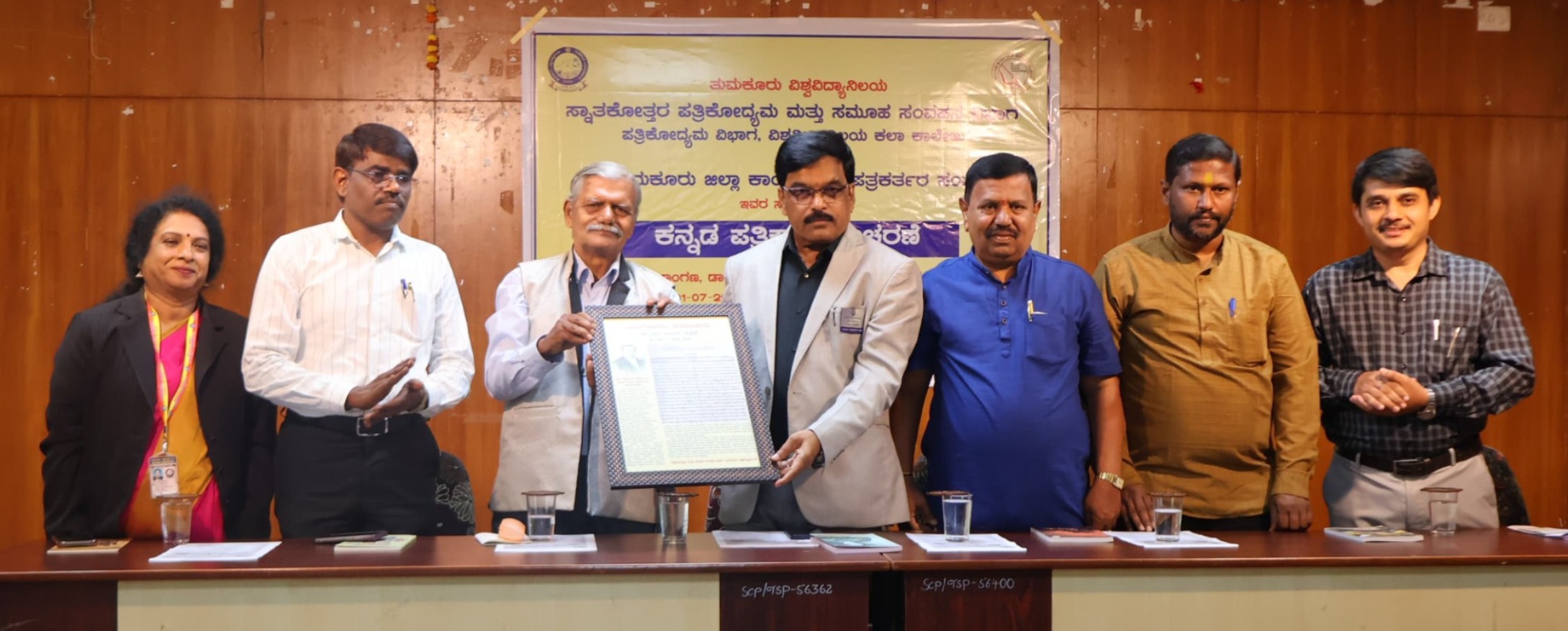On Kannada Journalism Day, experts urge budding journalists to prioritise developmental and investigative reporting over sensationalism, citing the legacy of pioneers like Hermann Mögling, P. Lankesh, and D.V. Gundappa
Tumakuru: Amid growing concerns about unhealthy competition in today’s media landscape, senior scholar and writer S. P. Padmaprasad called for restoring seriousness and originality in journalism during a special lecture on Kannada Journalism Day, organised by the Department of Journalism and Mass Communication at Tumkur University.
In his address, Padmaprasad remarked:
“Unhealthy competition is the norm today. We see panel discussions running for hours on trivial issues, with the same story projected as ‘breaking news’ for three to four hours. No government makes verdicts based on panel discussions.”
He added that to build journalistic credibility, reporting must focus on developmental and investigative journalism.
The scholar further highlighted that only when the media field is treated with seriousness can it earn credibility and leave a positive impression on society.
“Four qualities are essential for anyone in the media field, from editors to photographers:
Deep observation
Skillfulness
Originality with the ability to present unique and exclusive stories
Proper analytical skills with a deep understanding of history, language, political developments, and the region’s culture.”
Highlighting how the media landscape has become more complex compared to the earlier print and radio days, the scholar added:
“Technology and scientific innovations have enabled news to reach the public within five minutes. While that’s progress, it also poses problems. Development-related issues reach first, which is a form of advancement, but also demands responsibility.”
The role of Hermann Friedrich Mögling, regarded as a pioneer of Kannada journalism, was profoundly discussed. His love for Kannada was so deep that he was often misunderstood for opposing the Christian missionary ideology, when in fact, his primary drive was his admiration for the language.
“Today, reporters work verbally, using mobile phones for instant reporting. Media professionals must be technically skilled, understand camera operations, preserve history, and maintain pace with competitive platforms to remain relevant,” the speaker said.
Veteran journalists like P. Lankesh, Ravi Belagere, D.V. Gundappa, and TS Ram Rao were hailed for their commitment to original, in-depth, and error-free journalism. Their columns, especially in publications like Prajavani, showcased historical awareness and a dedication to truth.
M. Venkateswarlu, Vice Chancellor of Tumkur University, added:
“Today is significant. Non-Kannadigas laid the foundation of Kannada Journalism. July 1, 1843, marks the birth of this legacy. With the digital era, print’s importance is fading, but earlier newspapers played a crucial role. Everyone waited eagerly for them. Eenadu changed political thinking. But now, the youth have lost the patience to read. We need to revive voluntary reading to enhance knowledge.”
He expressed concern over how students rely on social media for news, often believing unverified information without critical analysis.
Sibanthi Padmanabha K V, Head of the Journalism Department, elaborated on Mögling’s German-to-Kannada contributions and the importance of Mangalore Samachara, India’s first Kannada newspaper.
Registrar of Tumkur University, M. Kotresh, emphasised the contributions of D.V. Gundappa and others to Kannada journalism, stating that their works must be studied to understand the ethical foundation of the field.
The program saw attendance from several dignitaries, including Chi. Ni. Purushottam, President of the District Working Journalists Association, Tumkur; T.E. Raghuram, Principal Secretary of the Association; Dakshayani G., Principal of the University Arts College; and over 100 journalism and non-journalism students.










No comments:
Post a Comment